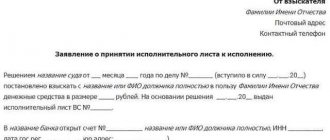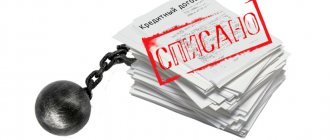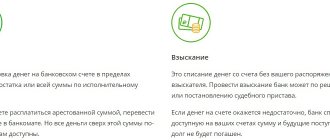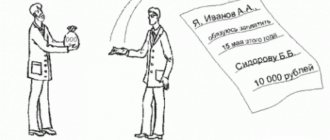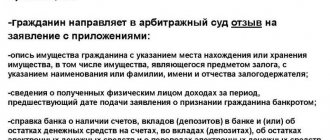A good friend comes to you and tearfully asks you to lend him some money to urgently repay a loan, for medicine for a second cousin, or for a trip to a sanatorium for his beloved wife, who needs to immediately improve her health.
You feel sympathy for your friend and lend him money without even taking a receipt. Why formalities - after all, this is your friend! Moreover, he asks for money literally for 1-2 months. You wait patiently, but 2, 3, 4 months, six months pass, and you still don’t see your money.
Surely a similar story has happened, if not to you, then to someone you know. In such a situation, many give up. Friendship is friendship, but you want to get your money back, because you don’t have too much of it.
Is it possible to repay a debt if there is no documentary evidence of the transaction - a receipt? And if so, how to do it? I, Anna Medvedeva, a regular author of the HeatherBeaver online magazine, will answer these questions in a new article.
Today you will learn:
- What are the features of recovering debts from individuals without receipts and witnesses?
- Is it possible to repay a debt without going to court?
- Where can I order debt collection services without a receipt?
At the end of the article you will find an overview of situations where, unfortunately, it is impossible to get your money back. Read carefully and do not make such mistakes.
- Step 1. Contact the borrower
- Situation 1. The statute of limitations has expired
We will tell you in our material how to repay a debt without a receipt.
Is it possible to repay a debt without a receipt?
Fearing being left without money, many lenders take the wrong actions, rush to contact the judicial authorities, the police department, and try to intimidate the debtor and return the money by force. Recovering debts from individuals without a receipt is possible, but the victim will face difficult legal battles.
Resolving the situation peacefully is the first step to take. Inquire about the reasons for non-repayment, try to discuss the terms and conditions again, try to draw up a receipt or loan agreement. If the debtor avoids meetings and conversations, it is necessary to collect evidence.
How to collect debt without conflict

How to collect a debt if all the deadlines specified in the receipt have passed, and the debtor is in no hurry to repay the loan?
The lender has several options for further action:
- Peaceful resolution of the situation.
- Going to court.
- Help from third parties.
Since going to court can take a lot of time and effort, and influence through third parties does not always guarantee impact on the borrower using humane methods, it is worth trying to come to a peaceful agreement first. It is possible that the person is in a difficult financial situation and does not have the means to repay the debt. In such circumstances, it would be appropriate to change the terms of the loan repayment by dividing the amount into parts or extending the terms.
If the debtor does not respond to persuasion or refuses to make contact, you should begin to influence him by drawing up written claims.
- Send the borrower a written notification that the repayment deadline has passed, and interest is accrued on the amount of debt as the overdue period increases at the refinancing rate of the Russian Federation. The letter must contain a demand to repay the loan.
- File another claim for non-repayment of debt, containing information about the intention to go to court or to debt collectors. It is worth mentioning that the court will probably protect the interests of the lender and then the costs of state fees and lawyers will have to be reimbursed to the debtor.
Requests to receive money from the debtor should be submitted by registered mail. This will allow the creditor to prove to the court that he tried to resolve the issue amicably . In the absence of a proper response from the borrower, repayment of the promissory note can only be carried out with the help of the court or third parties.
Proof
Many citizens are confident that without a receipt it is easy to prove the existence of a debt with the help of witnesses. Most often, in the absence of documentary evidence of the loan, the legal process begins with establishing the fact of misappropriation of funds through deception and breach of trust. But the testimony of witnesses in 99% of cases is not considered as evidence.
Proof of contact with the debtor must be provided. Any means and types of contacts are suitable: SMS, recording conversations, correspondence from social networks. It is important to mention in these conversations and correspondence about the loan, its terms, method of repayment and other terms of the agreement. The more evidence you can collect, the higher the chances of getting your money back.
Suitable evidence:
printouts of calls, SMS, screenshots of correspondence on social networks and email.
All printouts must be notarized, regardless of content. The notarial protocol involves a personal inspection by a notary of the computer from which the correspondence was made.
If money was transferred through a mobile bank or another electronic payment system, you must make a printout indicating the amount and date of transfer with the purpose of payment. To collect data, you will have to spend money and time.
Contacting the police
After collecting evidence confirming the fact of transfer of money, you can contact the Department of Internal Affairs to submit an application. The application must be accepted, after which the police can initiate a case for subsequent transfer to court.
If the application is not accepted, you can find out about the fact of official refusal in office work within 24 hours. If there is no receipt, and the police refused to accept the statement, such a decision can be challenged. The law allows you to file an application for civil proceedings based on non-repayment of a debt. If contacting the police does not lead to anything, go to court.
Trial
If you lent money to your friend, but did not take a receipt and do not have witnesses, do not be upset.
Indeed, in accordance with the legislation of 2020, there are some options for solving the problem in case of non-repayment of the debt. Let's look at how you can get your money back without breaking the law.

Have you ever been in a situation where your friends ask you to borrow money? And they couldn’t refuse, for fear of ruining the relationship with the person?
And they didn’t take any receipts when borrowing money from relatives and friends? Well, of course, it’s awkward to demand documentary evidence of a loan from “our own people.”
Have all the established deadlines for a refund passed, but you still haven’t seen the money? How can I pick them up now?
An oral agreement is dangerous because it remains oral. But is it really possible for no one to prove that the money was transferred? Or are there ways to return funds legally? Let's figure this out.
General points
Debt recovery is a sensitive situation. After all, it is necessary to act wisely and legally. And if the borrower firmly refuses to return the funds, then you need to figure out what rules apply in Russia on this issue.
Definitions
A loan is a type of obligation relationship. This is an agreement under which one party transfers ownership of a certain amount or product.
A promissory note is a document under which a borrower receives funds from a lender. The receipt must be drawn up in accordance with legal requirements.
| If the amount your friend needs is very large | Recommend that he contact a banking institution to apply for a loan. There are also a number of professional companies that can lend funds (meaning the consumer credit union) |
| Give the amount that is not too big for you | And you can live without it. Don't borrow more than you are willing to lose. This way you can “hold out” until your salary if your money is not returned on time |
| Some people advise against lending money to a friend. | So as not to lose it later. But you shouldn’t turn away from the person either - try to solve his problem together. Together we can overcome many obstacles |
| Think carefully before lending money | If you decide to help a person, then document such transfer of funds |
Analyze the borrower's solvency. Find out:
- whether he is paid his salary stably (demanding a certificate in form 2-NDFL is not an option);
- what are the funds for?
- whether he had an unforeseen situation - complications after surgery, dismissal, etc.
This information will tell you whether you are doing the right thing if you lend someone money, and whether you can hope to get it back.
If a loan amount is given, which is equal to 10 minimum wages, then the transaction should be documented. This is stated in legislative acts.
| Please indicate the date of refund on your receipt. | After 3 years you will no longer be able to claim the money |
| Please indicate in the document | That if there is a delay in repaying the debt amount, interest will be charged. Solving the question of how to return money without a receipt and witnesses with interest is not easy |
| Study the borrower's information | Name, address, place of work, etc. |
If there is no receipt, then you should know the following information.
So, you were not returned the borrowed money in a timely manner. What should I do? First, assess the situation. Try to resolve the conflict yourself without involving a third party.
| The borrower does not have the money to repay the full amount | But he has the ability to pay in parts. In such a situation, make concessions and write down what schedule should be followed when paying off the debt |
| The debtor has an unexpected situation | And at the moment he has no way to return the funds. Document the deferment of payments. You can include a clause on some compensation |
| The man has money, but he refused to return the entire amount | There is such a way out - agree to a partial refund, try to find a compromise through negotiations. Pressure from you is unlikely to be the right solution |
| The person does not want to return the money at all | Then the options are: forgive the debt or go to court |
If you did not take a receipt from the borrower, and there are no witnesses, then you will have to carefully look for evidence so that the court can make a decision in your favor.
If the fact of transfer of funds is not reflected on paper, then it will be difficult to prove your case. But there is a way out:
- file a police report;
- file a claim with a judicial authority;
- draw up a settlement agreement.
Such methods are legal and do not pose a threat to the life and health of borrowers.
Such companies do not always operate within the law and can cause harm to human health.
If you see that a person really cannot return the borrowed funds, then prefer a peaceful solution to the issue.
Prepare a settlement agreement, reflecting the following nuances:
- return periods;
- amount;
- consequences if conditions are not met.
Ask the borrower to write a receipt stating that he undertakes to repay the money within a certain time frame. Such a document will have legal force if it is certified by a notary
Contacting the police
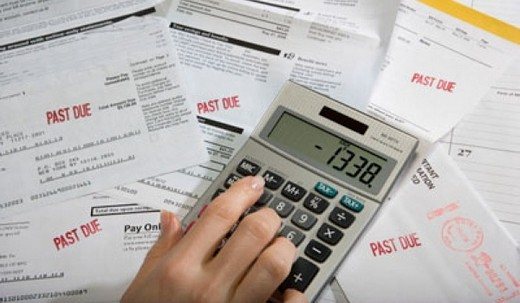
The application must indicate the date, place of transfer of funds, exact details of the debtors (passport details, date of birth, place of residence, etc.), the period during which the debt is not repaid, etc.
Within the time limits established by law, such an appeal is considered by a representative of the authorized body.
The borrower will be called in for questioning, after which they will determine how to proceed. If the person claims that he borrowed funds, then the case is referred to the court.
If he objects to receiving the money, then a criminal case will be initiated. Often, when the seriousness of the situation is explained, the person is willing to cooperate and return the money.
| Send a refund request to the borrower | If you don’t forget about this, you can significantly simplify the proceedings, since you will have evidence of attempts to resolve the issue peacefully |
| File a claim | It will not be free, as you will have to resort to the services of a lawyer |
| Pay the state fee | In the amount of 4% of the application amount |
| File a claim | It is possible through the court office or mail |
The authorized person will call the plaintiff and defendant to consider their positions and make a decision.
When going to court, they usually demand not only repayment of the debt, but also compensation for moral damage. Often, debtors, due to their unwillingness to pay compensation, are ready to return the borrowed amount.
At any time, a settlement agreement can be written reflecting the scheme for the return of funds in the presence of a third party. In this case, the process in court will be much simplified.
The availability of evidence and the behavior of the defendant will play a very important role in the decision.
If the borrower has a friendly attitude, but claims that it is impossible to repay the funds at this stage, then it is better to compromise and agree on a period for repaying the debt.
The legal process for refund issues is lengthy, grueling and complex. Therefore, it is better to take a receipt when borrowing a certain amount.
Each time, submit an application to a higher authority. When the investigation is completed, the results will be submitted to the judicial authority.
If the amount of debt is less than 50 thousand rubles, then the magistrate at the borrower’s place of residence will resolve the issue. If you need to return a large amount, you should go to the district court.
How to write a claim?
We list what data to include in the statement of claim:
- name of the court;
- plaintiff's details;
- defendant's details;
- document's name;
- description of the situation;
- statement of requirements - repayment of debt, interest, state duties;
- calculations of the cost of the claim;
- list of applications;
- date, signature.
You can ask the court to request a copy of the document refusing to initiate criminal proceedings, data from the mobile operator.
The law limits the amount that can be collected without receipts - no more than 10 minimum wages. If the amount is greater, then prove the loans. Oral agreements are not suitable as an argument here.
When calculating the cost of a claim, the following are taken into account:
- principal amount;
- interest for late returns;
- interest on the use of funds (if you agreed on this with the defendant).
When filing a claim, you should not count on automatic litigation. The court has 5 days to:
- acceptance of the application for consideration;
- return of claim;
- refusal;
- in order to decide whether to leave the claim without progress.
Any action will be recorded in writing. When the court decides to satisfy your demands, it will be transferred to the bailiff department.
Enforcement proceedings will be opened against the borrower. The bailiffs will find out the financial situation of the debtor and impose penalties.
Arbitrage practice
When determining how to return money without a receipt and witnesses, judicial practice should be taken into account first.
It’s great if you find at least some facts that will prove you are right.
If not, and the borrower himself denies receiving the money, then legal proceedings will not be easy. Enlist the help of a lawyer so that you can prove to the judge that you borrowed funds.
| or video recording of a conversation | In which the borrower does not deny that he borrowed money |
| Recording on a voice recorder | (it is advisable that in the conversation the interlocutor mentions the amount of debt, the repayment period and other important information) with a text transcript and explanations about who and how kept the record |
| Chat on the Internet | — |
| SMS printed and certified by a notary | — |
The more evidence is presented, the faster the problem will be resolved. Try also to prove that the person has the opportunity to repay the debt, but he refuses.
In the conversation, try to mention the amount of the debt, the date when it must be repaid and other points that may play an important role in the consideration of the case.
Going to court
For consideration of a claim for the return of a debt without a receipt for an amount exceeding 50 thousand rubles, a state duty of at least 1,700 rubles is paid. After paying the state fee, you must draw up a statement of claim, attach the collected evidence and wait for the judge’s decision.
Within 5 days, the court decides whether to accept the claim or return it to the applicant. The plaintiff must be notified in writing of the court's ruling. If the court sides with the plaintiff, the debtor can appeal its decision to the appellate authority.
Winning the trial is half the battle. The execution of a court decision can drag on for years; it is necessary to systematically visit the bailiff service to collect information about the financial situation of the debtor and the possibility of returning the debt from an individual without a receipt. For any questions, please contact our website lawyers.
What to do if the debtor does not pay the money
Try to follow our instructions to collect the money given on the receipt.
We offer three ways:
- Payment for the services of a collection agency or sale of debt to a private person.
- Filing an application for a court order.
- Initiation of legal proceedings.
Contacting a collection agency and selling debt

Today there are many companies that are ready to assist in collecting a loan without going to court.
The assignment of debt claims to third parties allows the victim to receive part of the amount given when concluding an agreement with a collector or private creditor. Further, the lender will not have to communicate with the debtor or contact law enforcement agencies.
However, the legality of the activities of collectors is questionable, and their services are not cheap - up to 50% of the debt amount. Therefore, if the debtor is in no hurry to pay the money according to the receipt, the issue should still be resolved through the court.
Court order
The court order is drawn up on the basis of the creditor's application. The order does not require the initiation of legal proceedings with a summons to the debtor; to issue it, a receipt is sufficient. The state fee for such a case costs two times less than when filing a regular claim.
The order is issued to the borrower along with a writ of execution, on the basis of which the bailiffs simultaneously begin their work. The task of the bailiffs is to collect from the debtor the entire amount of the debt with overdue interest, using coercive measures if necessary.
If within 10 days from the date of the court order the borrower manages to express disagreement with its requirements, the document is canceled.
Statement of claim to court
The process of filing a claim in court is divided into several stages:
- Drawing up an application. The following information is included in the claim: name of the judicial authority, full name, place of residence and contacts of the parties, amount of debt, taking into account all related expenses, list of attached documents.
- Payment of state duty. The amount of tax depends on the estimated amount of the claim.
- Sending documents to court. The list of papers includes an application, a receipt, a receipt for payment of the state duty, a report on the assessment of the claim (if applicable), letters of demand and other documents proving the guilt of the debtor.
- Waiting for a decision from the executive body.
Once a claim is filed in court, both parties will be subject to legal proceedings applying all the rules of the Code of Civil Procedure.
Be prepared for the process to be time-consuming and costly, as the borrower may ignore subpoenas or dispute the receipt. In addition, the court may require the provision of additional evidence or an examination proving the involvement of the parties in drawing up the agreement on the transfer of debt.
To initiate legal proceedings, it makes sense to contact law firms for help in returning the debt under the receipt. A qualified specialist is able to competently draw up a claim, collect additional evidence of the debtor’s guilt and provide the necessary information support to the lender.
In addition, law firms provide significant support after a court decision is made: they help locate the debtor’s property and monitor the work of bailiffs.

